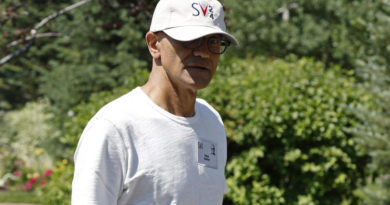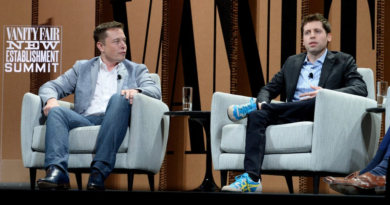‘Parroting Putin’s propaganda’: The business exodus over Ukraine was no Russian bonanza
Sometimes, political reporters without a background in business journalism make egregious errors in their coverage of the business exodus from Vladimir Putin’s Russia–and even fall for the strongman’s Potemkin Village-like economic façade. A recent article, entitled How Putin Turned a Western Boycott Into a Bonanza, wrongly suggested that the historic business exits of over 1,000 multinational companies from Russia have somehow been a huge win for the Russian war effort, while paradoxically suggesting that multinational firms did not really exit. Nothing could be further from the truth.
We write not as mere spectators but as some of the leaders who helped catalyze this unprecedented business exodus from Russia. (Although the New York Times article names the first author extensively and egregiously omits the prominent role played by the Kyiv School of Economics (KSE) in chronicling the business exodus and continuing to encourage companies to exit today).
If the business exodus was so helpful to Putin, we would like to know why all four of us have been placed on Putin’s sanctions list, with the first author ranked #6 on that enemies list (even higher than Senator Mitch McConnell).
In addition to helping catalyze the business exodus, our research collaboration has helped counter Putin’s propaganda by showing the economic devastation wrought by his war. Russia is no longer remotely an economic power and has suppressed the minimum reporting of transparent national income statistics that is required to retain IMF membership. With industrial might below that of Chile, Putin’s Russia survives merely by seizing assets. The increasingly state-dominated economy is cannibalizing its own companies to maintain Putin’s war machine.
A misguided premise
We are concerned that the authors of the NYT article may be falling for the same kind of Russian propaganda we have been so tirelessly debunking over the past two years. In fact, they back their critique by unquestioningly quoting Kremlin officials: Putin’s discredited spokesperson Dmitri Peskov, a Putin-picked Russian buyer of assets, as well as Putin himself. The last word is given to Dmitri Medvedev, the unhinged former Russian president who casually and regularly threatens to use nuclear weapons against Ukraine. No wonder the Russian government is enthusiastically tweeting out the NYT article across official accounts.
In reality, the exits of over 1,000 global enterprises from Russia (out of 1,400 major global enterprises before the war) have had a crippling effect on business confidence, foreign investment, and the overall Russian economy. Even the Kremlin admits that “it prefers that companies remain in Russia,” as the article duly notes.
To support their erroneous thesis that the business retreats have paradoxically only helped Putin, the reporters focus on the costs incurred by multinational companies in leaving Russia, pointing to billions in asset write-downs and lost revenues. But this fails to capture the full picture.
The companies that exited Russia outperformed those that remained, according to our analysis of market data. As we noted last year, the increase in market capitalization of the exiting companies was more than double the value of asset write-downs–hardly surprising considering that for most companies, Russia represented no more than ~1-2% of their global revenues. Plainly put, exiting Russia was value additive, not value destructive, for global multinational companies. Looking only at the value of Russian asset write-downs ignores the financial and reputational benefits reaped across the rest of the world by the companies that exited Russia.
As further evidence that the business retreats are helping Putin, The reporters focus on how the Kremlin is mandating companies sell their Russian assets for at least a 50% markdown as supposed evidence that Russian buyers are getting “good deals”–but conveniently ignore how the valuations of Russian assets have plummeted across the board since Putin’s invasion.
In fact, the total enterprise value of leading Russian state-owned companies has plummeted even lower. For example, Gazprom’s enterprise value shrank by 75%, far in excess of the valuation markdowns incurred by most foreign companies. The Times characterizes the Russian asset divestitures of global multinationals as a “huge transfer of wealth” to Putin’s cronies, but with valuations of even Russia’s top state-owned companies down so much, the real story is one of massive, unprecedented wealth destruction as Russian assets plummet, whether they’re owned by Russians or foreigners.
It seems that to the reporters, businesses can do nothing right. In the same breath, they attack companies that have exited Russia for enabling a transfer of wealth to Putin cronies, they falsely claim “most foreign companies remain in Russia, unwilling to lose the billions they’ve invested there over decades.” The reporters note that companies leaving Russia were forced to pay $1.25 billion in taxes to fund Putin’s war effort–and ignore the 75% decline in the annual amount of taxes Putin received from foreign companies before the war as demonstrated by KSE.
The NYT article also blatantly mischaracterizes the first author’s track record by claiming that “the question of who would end up with those companies was of little concern” to the first author. That is demonstrably false. Over the last 18 months, the first author has been a strong and consistent advocate for sanctioning Russians who take over Western companies and enable Putin’s war machine, and has spent considerable time advising the U.S. Treasury Department informally on individuals of sanctions interest, alongside colleagues such as Amb. Michael McFaul’s of the McFaul-Yermak Sanctions Working Group, as well as the co-authors of this Commentary piece from the Kyiv School of Economics. Together, we have been vocal in our shared frustration that tougher sanctions enforcement is needed, with KSE continuing to track sanctions gaps and efficacy daily.
What’s really happening with Russia’s economy
The wave of nationalizations and asset seizures raised in the article reflect Putin’s weakness, not strength, as we’ve noted before. Russia is becoming a kleptocracy, with Putin cannibalizing the entire productive economy to fund his whims. The state is commandeering more of the economy to add to its cookie jar to fund the war. Business activity needs continuous investment in capital, people, technology, and ideas to sustain itself. Putin can pad his coffers in the short-term with thuggish asset seizures and nationalizations, but he is setting the Russian economy on the path to ruin. Thanks to Putin’s seizures, no multinational firm can justify returning to, or increasing investment in, Russia as long as he remains in power.
As the reporters should have noted, only Putin cronies are buying discarded Russian assets from exiting multinationals because nobody outside of Russia wants to invest a penny into the country. Even the Chinese are hardly rushing to snatch up discounted Russian assets. If Russian assets are really such a “good deal,” why is it that even Russia’s allies refuse to buy in?
Although the Russian economy is struggling by any measure, with several sectors of the economy down by at least 90%, and energy export revenues down by half.
It is fair to say that the initial potential of the Russian business retreats, paired with economic sanctions, to completely cripple the Russian economy is not being fully realized at the moment, with escalatory economic measures put on the back burner in favor of fighting it out militarily on the battlefields of eastern Ukraine. But to say that the Russian business retreats are somehow helping Putin is false.
Simply put, when businesses pull out of Russia, Putin loses, no ifs, ands, or buts. The transfer of defunct or imploding assets to Putin’s cronies does not enrich Russia. There are no lines of eager diners around Moscow’s former McDonalds. And even as they stumble onwards in the short term, few Russian companies have a future without Western technology. In aviation, for example, the number of aircraft failures in Russia increased by 320% this year, and domestic commercial airlines have stopped offering many routes, with the S7 airline unable to operate at least 20% of its fleet due to difficulties in servicing Airbus planes.
With U.S. funding for Ukraine potentially running out amidst our domestic political dysfunction and military setbacks on the battlefield in Ukraine, this may be the most perilous moment for Ukraine since Putin’s initial assault on Kyiv.
Journalists have a responsibility to get their facts straight without parroting Vladimir Putin’s propaganda. Already, Putin has kidnapped the courageous young Wall Street Journal reporter Evan Gershkovich, who has spent the last nine months in a Russian prison. Gershkovish’s only “crime” was to document the unraveling of Russia’s economy due to sanctions and mass business exits through his field research in Russia.
Days after publishing the evidence of shuttered factories, mass talent flight, and the halt of investment in Russia, the Russian authorities arrested that brave American reporter. But Putin cannot hijack the truth–unless we let him.
Jeffrey Sonnenfeld is the Lester Crown Professor in Management Practice at the Yale School of Management. Tymofiy Mylovanov is the President of the Kyiv School of Economics and a former minister in the cabinet of President Volodymyr Zelenskyy of Ukraine. Nataliia Shapoval is the Vice President for Policy Research at the Kyiv School of Economics and Chair of the KSE Institute. Steven Tian is Research Director at the Yale Chief Executive Leadership Institute.
More must-read commentary published by Fortune:
- Economic pessimists’ bet on a 2023 recession failed. Why are they doubling down in 2024?
- COVID-19 v. Flu: A ‘much more serious threat,’ new study into long-term risks concludes
- Access to modern stoves could be a game-changer for Africa’s economic development–and help cut the equivalent of the carbon dioxide emitted by the world’s planes and ships
- The U.S.-led digital trade world order is under attack–by the U.S.
The opinions expressed in Fortune.com commentary pieces are solely the views of their authors and do not necessarily reflect the opinions and beliefs of Fortune.




